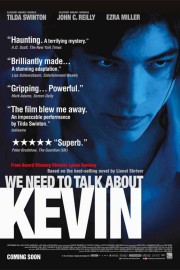We Need to Talk About Kevin
At the 2021 Sundance Film Festival, I watched a terrific drama called “Mass.” It had two sets of parents who had children as part of a mass shooting meeting to discuss things, and hopefully, heal together. One set lost a child in the shooting; one set’s child perpetrated the shooting. Watching “We Need to Talk About Kevin” for the first time, my thoughts went back to that film as we watch Eva, the mother of Kevin, who perpetrated mass murder at his high school, struggle to put her life back together afterwards. We don’t really learn a lot about the parents of teenagers who commit these crimes; that’s part of what brings value to both “Mass” and Lynne Ramsay’s film, although the latter is not as simple to digest.
The novel by Lionel Shriver that Ramsay and co-writer Rory Stewart Kinnear are adapting features Eva as an “unreliable narrator,” which is to say, a main character whose perspective on the events in a book or movie we are to call into question. In the movie, Ramsay achieves this through a series of flashbacks as Eva (played by the powerful Tilda Swinton) is trying to put her life together. Formerly a successful writer, with a husband and family, Eva is now living in a squalid house, and working at a small travel agency in town. We see her thinking back on her life with Randall, her husband (played by John C. Reilly), but most of her memories go back to Kevin, their son who, at 16, locks dozens of students in the school gym, and murders them with a bow and arrow. In these flashbacks, we see Kevin as an immensely disturbed boy, insolent towards his mother and always being difficult. His eyes give off a sinister look from an early age, and it unsettles Eva, especially when they have a daughter, Celia (Ashley Gerasimovich), and Kevin does not really warm up to having a younger sister. Throughout the film, we are left to wonder if Eva truly did see this side of Kevin, or if she’s simply projecting it on to him after his horrific crimes as a way to reconcile the reality of what he did in her thoughts. We do not get any clues from Ramsay that it is a rewrite of her memories, but when we finally see the extent of his destruction at the end, and how remorseless he is, we would not blame her for wanting to make Kevin out to be a monster from the beginning, as that would imply that- as a parent- there was nothing she could really do to present this massacre. That’s certainly more palatable than thinking you messed up somewhere down the line.
There are times during this film where Kevin is presented as almost ridiculously bad, especially as a child; there’s a part of you that thinks that he has to just be acting insolent towards Eva, and more affectionate towards Randall, out of spite. That’s almost giving a kid too much credit for their ability to process emotions, however, but it’s also feeding into a classic movie trope- the “bad seed” who’s just genuinely wicked at their core, and it’s what makes it feel more plausible that these memories are projections of Kevin’s later behavior on his younger self. When we start to see Kevin as a teenager, however, his sullen, troubling behavior becomes more plausible, and that’s a credit to the performance by Ezra Miller. He understands what the character requires, and the way he brings it out is one of the most terrifying young performances I’ve ever seen- he has no moral compass, and no remorse for his behavior. This is a believably evil character, and his interactions with Swinton are like chess matches between characters whose emotional cores are set in stone when they meet in jail, and a final scene that lays bare who Kevin is, and where Eva is in her processing of her emotions towards him.
Ultimately, the film comes down to Eva, and this is one of Swinton’s great performances, as she carries us emotionally through the struggles of parenthood, and the grief of realizing that your child did something so awful, you will be forever ostracized for it. By the end, it feels as though she’s found some piece, but that doesn’t make what we’ve seen her go through any easier to witness, whether it’s entirely accurate, or just the delusions of a mind trying to cope with tragedy.










